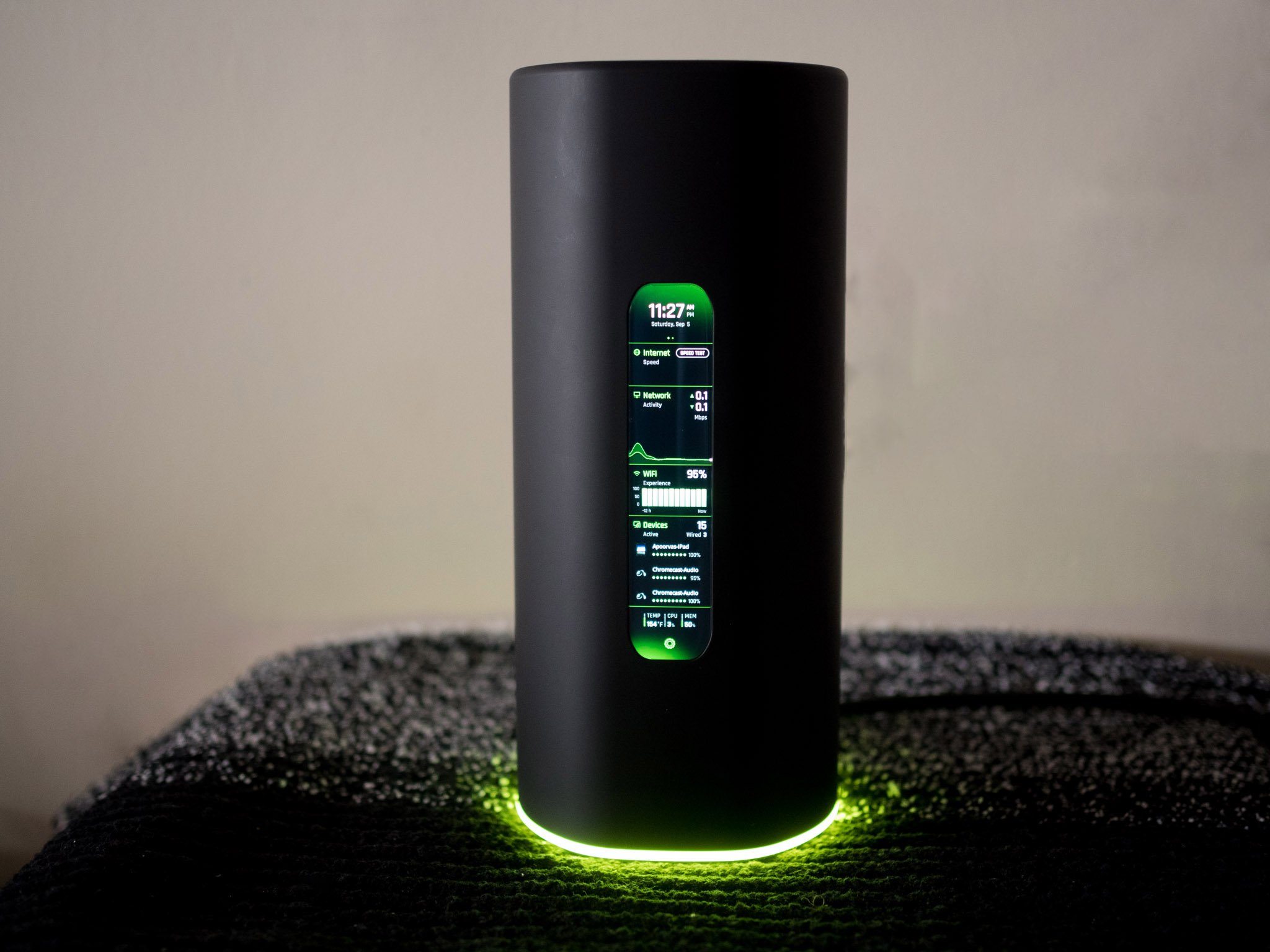Android Central Verdict
Bottom line: The AmpliFi Alien delivers whole-home Wi-Fi 6 coverage and is easy to set up. You get excellent performance on both Wi-Fi 6 and Wi-Fi 5 devices throughout your house, the large LCD screen gives you a real-time overview of your home network, and you get useful additions like Teleport.
Pros
- +
Blankets your home in Wi-Fi 6 connectivity
- +
Excellent throughput
- +
Towering design with large LCD panel
- +
Easy to set up and use
- +
Teleport is genuinely useful
Cons
- -
Cannot be mounted on a wall
- -
No dedicated backhaul in mesh mode
Why you can trust Android Central
We're at a point where Wi-Fi 6 routers are now a mainstream option, but that didn't make me any less excited to dive into this Ubiquiti AmpliFi Alien router review. All Android flagships launched within the last 18 months feature Wi-Fi 6 connectivity, as do most mid-range and high-end notebooks. We've also seen the category mature as budget Wi-Fi 6 routers made their debut, and if you're looking to upgrade your home router, now is as good a time as any to make the switch to Wi-Fi 6.
That's where the Ubiquiti AmpliFi Alien comes in. Ubiquiti isn't as well-known as mainstream vendors like ASUS or Netgear, but it makes some of the best networking equipment regular users can buy. While its UniFi series is aimed at prosumers, the AmpliFi series is focused on the mainstream segment.
The Alien debuted at the start of the year, and I've been using it for just under two months now. The router is available as a standalone option for $379, or use it as a mesh system with the router and a satellite that retails for $699. So let's take a look at what the Alien has to offer, and whether it's a good fit for your home networking needs.
Ubiquiti AmpliFi Alien Specs
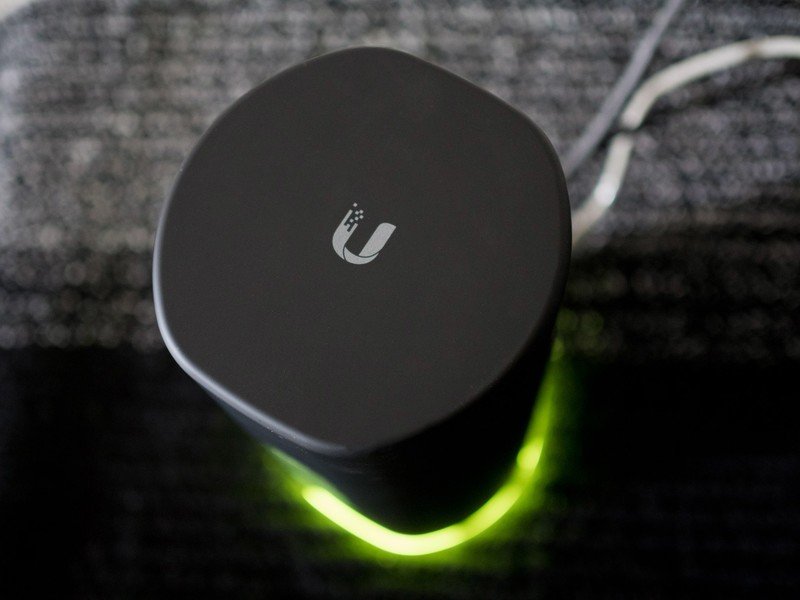
Like most high-end routers in the market today, the Alien is a tri-band model with a 2.4GHz Wi-Fi 6 band along with two 5GHz bands: a low band based on Wi-Fi 5 and a high band on Wi-Fi 6 that delivers up to 4804 Mbps. It has five Gigabit Ethernet ports at the back — one WAN and four LAN ports — beamforming, and a large screen that shows real-time network statistics. Here's an overview of the hardware on offer:
| Category | Ubiquiti AmpliFi Alien |
|---|---|
| Wi-Fi Standards | Wi-Fi 6 Wi-Fi ac/n/g/a/b |
| 2.4GHz (Wi-Fi 6) | 4 x 4 MIMO (Up to 1148 Mbps) |
| 5GHz-1 (Wi-Fi 5) | 4 x 4 MIMO (Up to 1733 Mbps) |
| 5GHz-2 (Wi-Fi 6) | 4 x 4 MIMO (Up to 4804 Mbps) |
| Wi-Fi Channels | 20MHz, 40MHz, 80MHz |
| Wi-Fi Features | MU-MIMO, OFDMA, Tx-Beamforming |
| Display | 4.7-inch (274 x 1268) 279 ppi G+F Touch, Full Color |
| Chipset | 2.2GHz quad-core CPU |
| Networking Ports | 4 x Gigabit Ethernet (LAN) 1 x Gigabit Ethernet (WAN) |
| Security | WPA2 |
| USB Port | No |
| Link Aggregation | No |
| Dimensions | 110 x 110 x 250 mm |
| Weight | 2.65lb (1.2kg) |
Ubiquiti AmpliFi Alien Overview and features
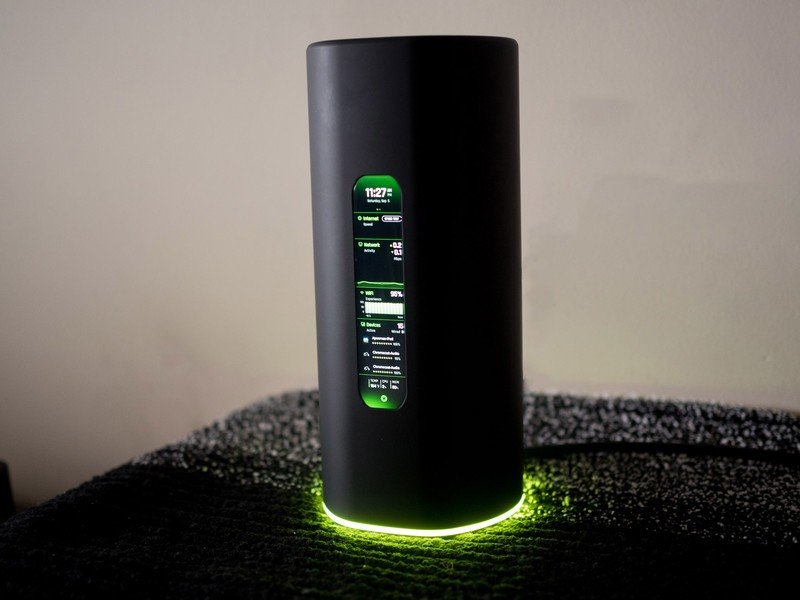
As far as naming goes, Alien is an apt name for this router. With a tall profile of 250mm, the router is unlike any I've ever used, and that list includes ASUS' arachnid monstrosity. The Alien looks less like a router and more like a beefed-up Echo Plus with a matte finish — there's even a light ring, albeit at the bottom.
The Alien has a large screen that lets you easily see real-time network activity.
The standout design feature on the Alien is the LCD screen. The 4.7-inch panel has a resolution of 274 x 1268, and it gives you a visual overview of real-time bandwidth, all the devices connected to your network, and resource usage.
As someone that has a monitor set up on a Pi 4 to monitor bandwidth on my home network, I love the screen on the Alien. It offers an easy way to see what's going on with the router, and as it is a touchscreen, you get the option to swipe through to access the router's settings, all the devices on the network along with their LAN IP addresses, device stats, and even the ability to run a bandwidth test directly on the router.
Get the latest news from Android Central, your trusted companion in the world of Android
The Alien comes with an LED light ring at the bottom that glows green. I've been conditioned over the last two decades to associate that particular shade of green with NVIDIA, so I automatically find this feature to be particularly cool. There's also a built-in speaker that gives audible alerts whenever the router boots up and if the internet goes down.
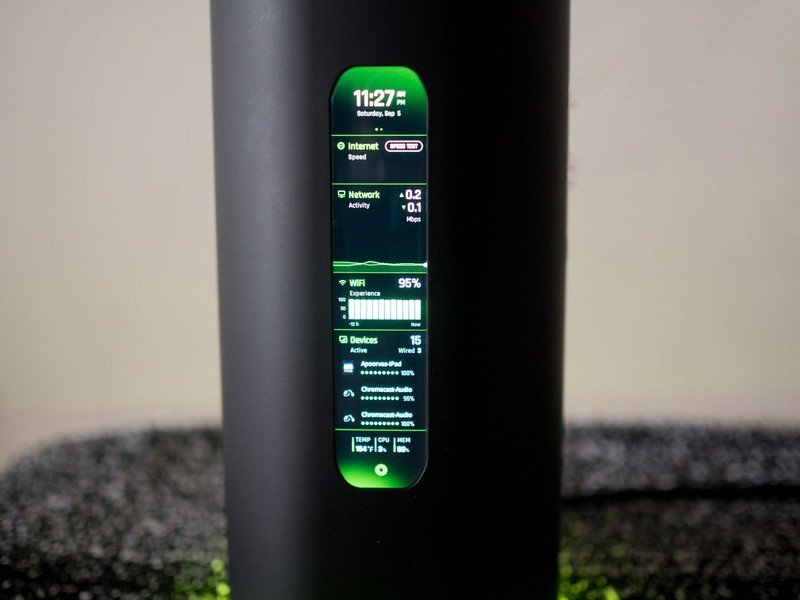
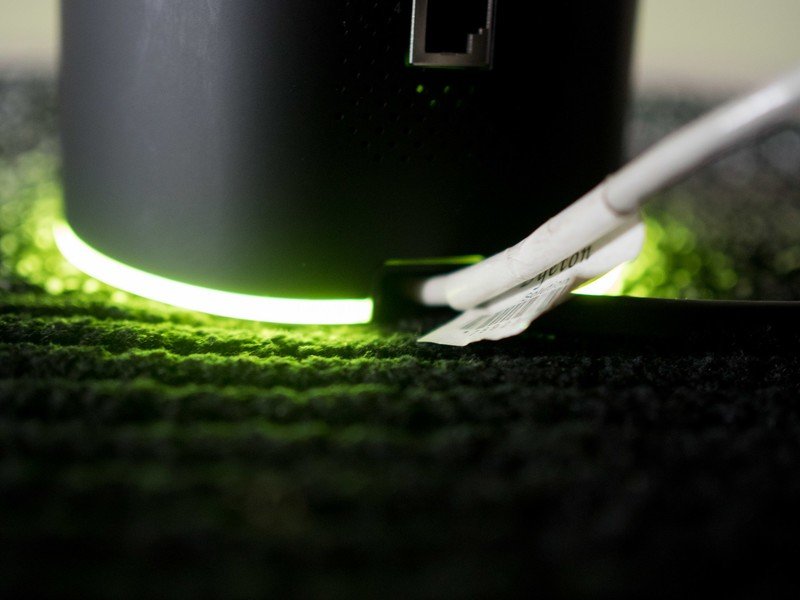
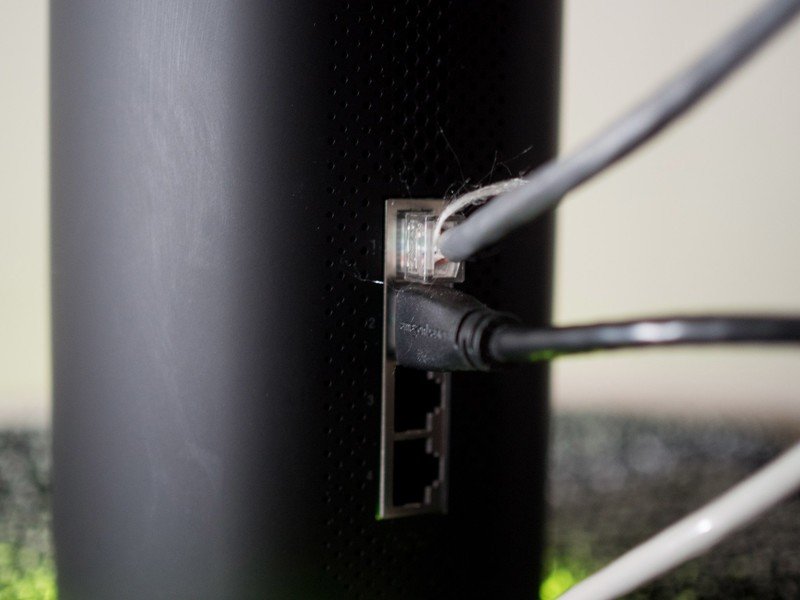
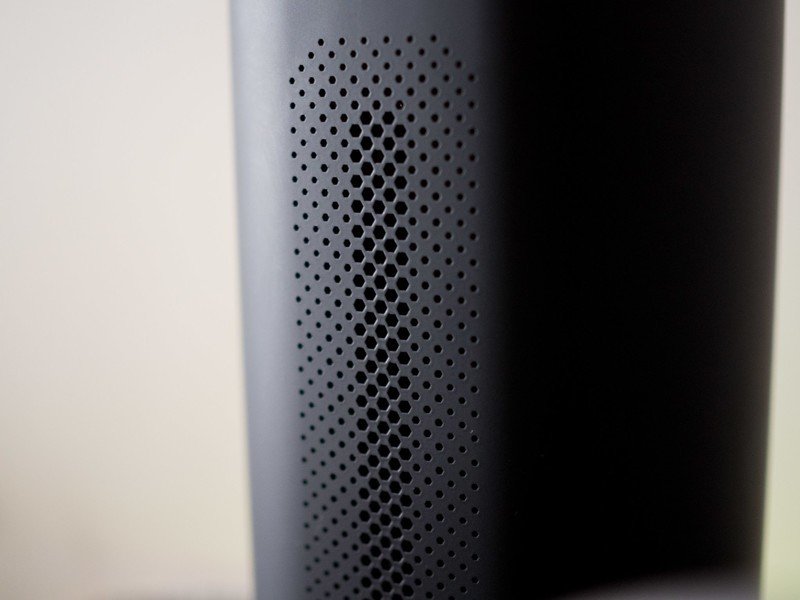
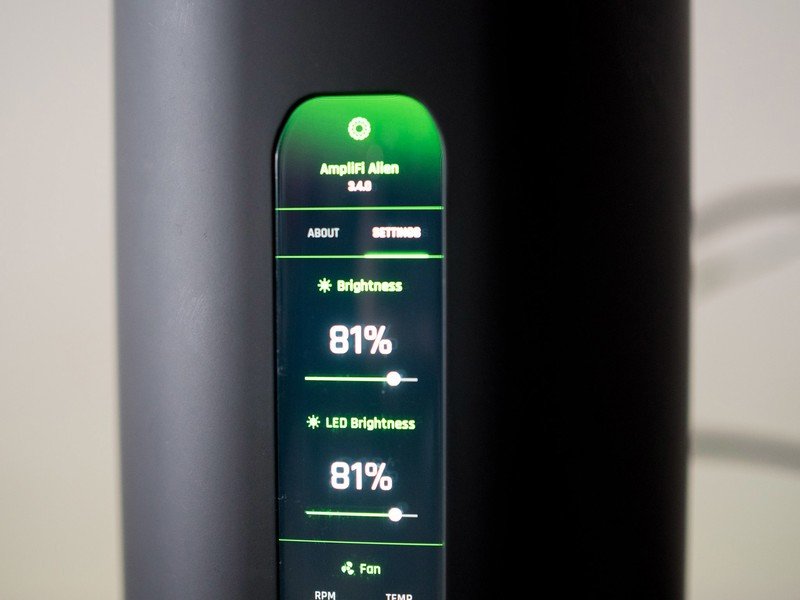
You can adjust the intensity of the light or turn it off entirely if you're not fond of a bright light emitting from the router. You can also adjust the brightness of the screen itself and schedule both the LED light ring and screen to turn off at night.
There are four Gigabit Ethernet LAN ports at the back, and a single WAN port. The LAN ports are oriented vertically, and the WAN port is located in the base next to the power outlet. There's no USB port here, but it's not a big deal.
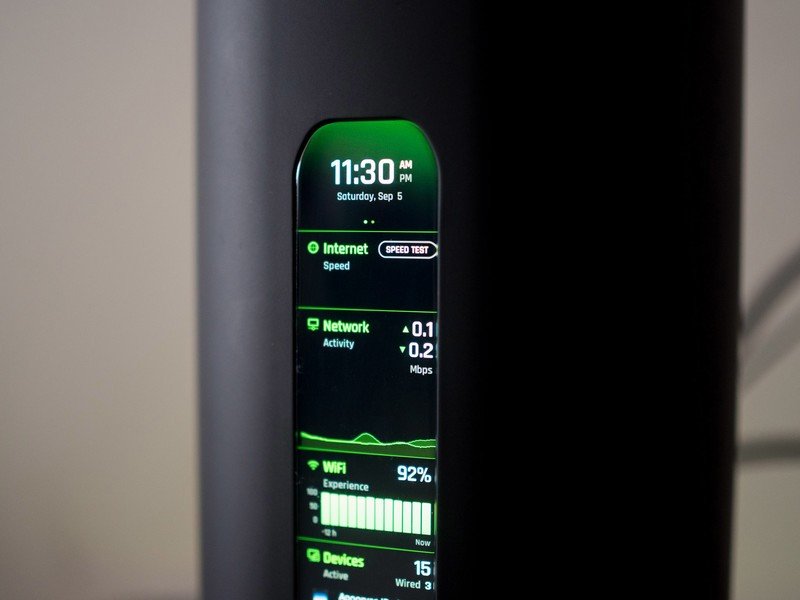
Setting up the Alien is about as straightforward as it gets, and shouldn't take more than five minutes. All you need to do is plug in the cable from your modem into the WAN port, power up the router, and install Ubiquiti's AmpliFi Wi-Fi app from the Play Store. The app allows you to set up the SSID for the router, create a password, and add configuration options based on your service provider's requirements.
Ubiquiti's AmpliFi Teleport feature is a unique addition that makes the Alien stand out.
Once you set things up, the AmpliFi dashboard gives you an overview of the router's connectivity status, connected devices, real-time bandwidth usage, and the ability to adjust wireless settings. The interface is geared at mainstream users, and what it lacks in advanced features — like the ability to set up a VPN server — it makes up for in ease of use. The interface consists of five tabs: Overview, Performance, Guest, Devices, and Diagnose.
The overview tab shows the number of devices and real-time usage figures, and you get the ability to access a router or satellite's settings page from this tab. You can change the name of your network, assign new SSIDs to each band, use band steering to prioritize the 5GHz band (which has less range but delivers more throughput), set up a custom DNS server and configure port forwarding, use the router in bridge mode, and adjust the brightness of the router's screen and LED light ring.
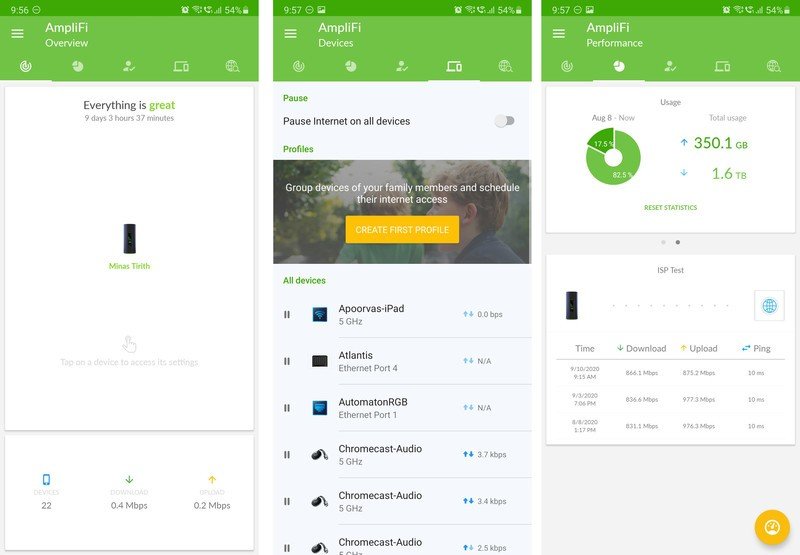
The performance tab lets you see bandwidth usage figures from the time you started using the router, and lets you take bandwidth tests to measure connectivity. You can set up a guest network from the guest tab and view all individual devices, prioritize traffic or pause the internet for a particular device from the devices tab.
My favorite feature on the Alien is Teleport. The feature is available on all AmpliFi devices, and it essentially lets you connect to your home Wi-Fi network when you're traveling. Now I know that international travel feels like a laughable idea, but I see this coming in handy once things normalize, and we're able to travel again.
Teleport essentially creates a tunnel to your home Wi-Fi network, a private VPN network that uses your home Wi-Fi. As a result, you'll be able to access the Netflix or Prime Video catalog from your home country even when you're abroad. The feature also comes in handy when you're connected to a public Wi-Fi network, as all data sent over Teleport is encrypted. To use Teleport, you'll need to download the app from the Play Store and configure an access code for each device.
Ubiquiti AmpliFi Alien Performance
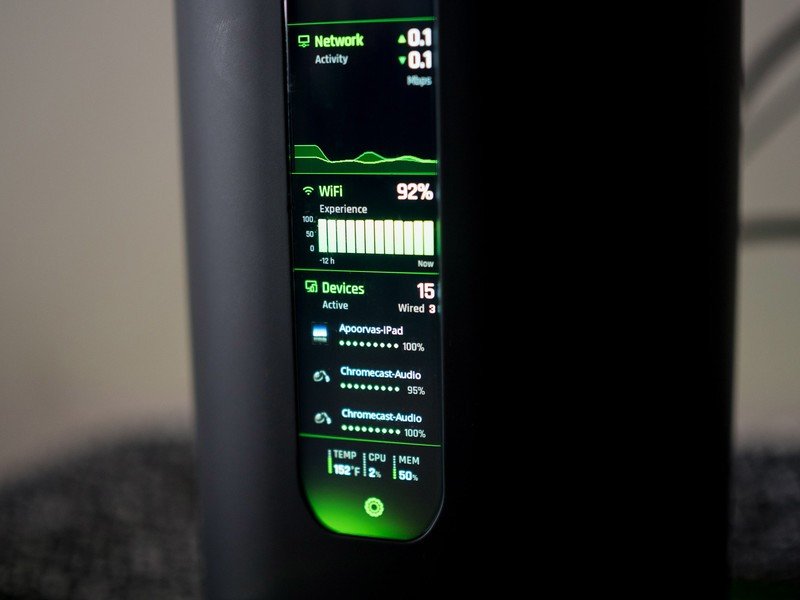
All of the best Wi-Fi 6 mesh routers in 2020 have one thing in common: they deliver whole-home coverage and ensure you get reliable Wi-Fi connectivity throughout your home. The Alien is no exception; it features a 4 x 4 Wi-Fi 6 radio with a maximum throughput of 4804 Mbps, and you get MU-MIMO and beamforming — the ability to focus wireless signal toward a particular device for better connectivity.
I tested the Alien with several Wi-Fi 6 client devices, including the Galaxy Note 20 Ultra and Xiaomi Mi 10 Pro. My work machine has a Gigabyte Z490 Aorus Master motherboard with a built-in Wi-Fi 6 modem. While I usually plug in the machine via a network switch to the router (wired is still the only way to get over 900 Mbps downloads), I switched to the Wi-Fi 6 modem to test connectivity.
Ubiquiti AmpliFi Alien (Wi-Fi 6)
| Location | Ping | Down speed | Up speed |
|---|---|---|---|
| Office (15 feet) | 2 ms | 510 Mbps | 530 Mbps |
| Kitchen (25 feet) | 3 ms | 450 Mbps | 322 Mbps |
| Guest bedroom (40 feet) | 3 ms | 380 Mbps | 360 Mbps |
| Master bedroom (>50 feet) | 4 ms | 285 Mbps | 192 Mbps |
The AmpliFi Alien offers sizable performance gains provided you have devices that can connect over Wi-Fi 6. This is the first Wi-Fi 6 router I've used, and even though I'm using the standalone option without any satellites, I got excellent performance throughout the house. The master bedroom is the furthest point away from the router, and it managed to deliver decent bandwidth there as well.
I had no issues with streaming and didn't see any latency when gaming, and in the two months I used the Alien, I didn't encounter any drawbacks.
Ubiquiti AmpliFi HD Mesh (Wi-Fi 5)
| Location | Ping | Down speed | Up speed |
|---|---|---|---|
| Office (15 feet) | 2 ms | 455 Mbps | 407 Mbps |
| Kitchen (25 feet) | 4 ms | 348 Mbps | 267 Mbps |
| Guest bedroom (40 feet) | 5 ms | 312 Mbps | 240 Mbps |
| Master bedroom (>50 feet) | 5 ms | 176 Mbps | 148 Mbps |
Even though I'm using a single Alien unit, I got better performance over the AmpliFi HD mesh solution. That said, in most day-to-day tasks, there is no difference between the two devices, and if you want better coverage and don't want to switch to Wi-Fi 6 just yet, the AmpliFi HD mesh system is a decent pick at $340.
Synology RT2600ac + MR2200ac (Wi-Fi 5)
| Location | Ping | Down speed | Up speed |
|---|---|---|---|
| Office (15 feet) | 2 ms | 410 Mbps | 358 Mbps |
| Kitchen (25 feet) | 5 ms | 362 Mbps | 274 Mbps |
| Guest bedroom (40 feet) | 5 ms | 320 Mbps | 244 Mbps |
| Master bedroom (>50 feet) | 6 ms | 184 Mbps | 121 Mbps |
The Alien also managed to beat out Synology's excellent RT2600ac and MR2200 mesh system. It delivers better bandwidth across the board and had better connectivity even as a standalone unit.
While the Alien has a lot to offer, there are a few points to note here: the router does not offer Link Aggregation, so if you have a NAS enclosure that has dual Gigabit Ethernet ports, you miss out on failover and the added throughput that comes with bridging two Ethernet lines. That said, most consumer NAS hard drives hit their limit at 120MB/s or so anyway, so you're not missing out a lot in terms of bandwidth.
Although the Alien delivers excellent performance, it is missing out in a few areas.
The more egregious omission is the lack of the 160MHz channel. This larger-width channel is commonly used for 5GHz coverage over the Wi-Fi 6 standard, but on the Alien, you're limited to 20/40/80MHz. That's a letdown because the 160MHz allows for decent gains in throughput, particularly with Wi-Fi 6 client devices. Again, this isn't a huge issue as you still get sizable gains over Wi-Fi 5 options, and there are few routers in the market today that offer a 160MHz channel, but it is something to consider.
Finally, there's the issue of using the Alien as a mesh system. I'm testing the router in standalone mode, but Ubiquiti sells a two-pack with a satellite that lacks a screen. The mesh system should deliver much better coverage for homes 3,500 sq. ft. and larger, but the main issue is that the router does not have a dedicated wireless backhaul.
With a traditional tri-band system with one 2.4GHz and two 5GHz bands, one 5GHz band is allocated for backhaul — a dedicated band where data is transferred from the router to the satellite without interference from client traffic. As that's not the case with the Alien, you may see some signal attenuation when using the router in mesh mode. That said, the Alien satellite has an Ethernet port, so you can always just pull a cable from the router to the satellite and have a dedicated wired backhaul — if that's a feasible option.
Ubiquiti AmpliFi Alien Competition
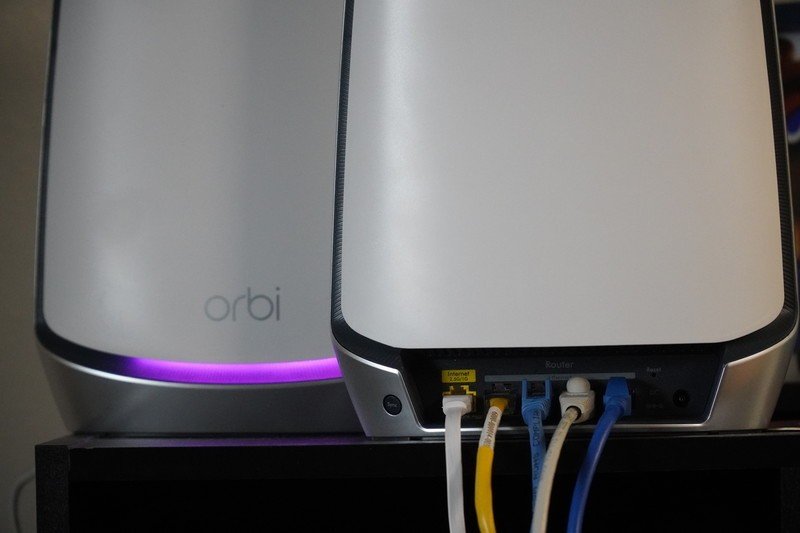
If you're in the market for a Wi-Fi 6 router, the $450 Netgear Orbi RBK752 is a great option to consider. The Orbi delivers the same robust connectivity, has a dedicated wireless backhaul, and the satellite has two Ethernet ports.
The Synology RT2600ac is one of the best Wi-Fi 5 routers money can buy today, and while the Alien edges out Synology's router in terms of bandwidth, you get an exhaustive array of features on the RT2600ac that you won't find on most consumer routers. With the unique mesh system consisting of the RT2600ac and MR2200ac coming in at $356, it is a fantastic overall choice.
Ubiquiti AmpliFi Alien Should you buy?
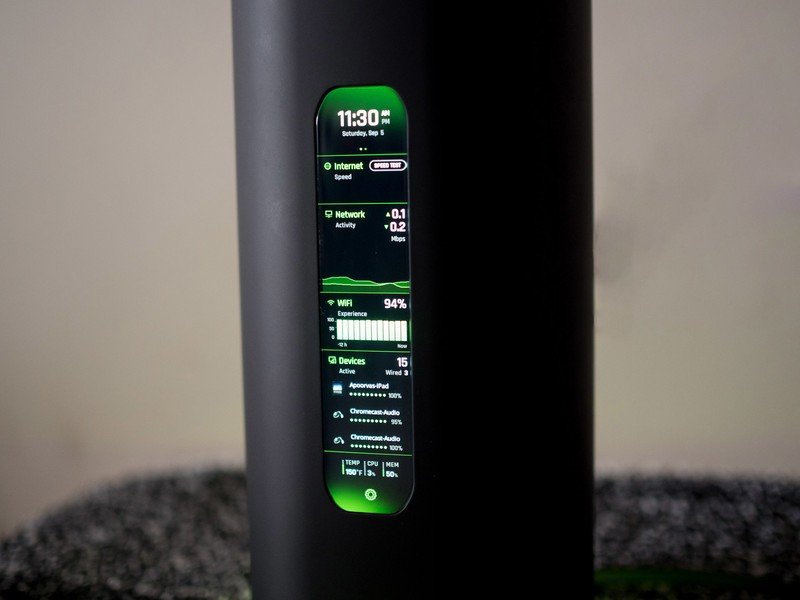
You should buy this if ...
You want to switch to Wi-Fi 6
With the Wi-Fi 6 standard now mainstream, the Alien ensures your network is future-proof.
You want whole-home coverage
Even as a standalone unit, the Alien delivers reliable coverage throughout your home — I had zero issues in my 2,000 sq. ft. home.
You want a router that's easy to manage
The Alien is about as easy to set up and use as any router I've used over the last decade, and it takes just five minutes to configure.
You should not buy this if ...
You want to mount the router to the wall
With a huge profile and coming in at 2.65lb, it's just not feasible to mount the Alien on a wall.
You're looking a tri-band mesh system
Without a dedicated mesh backhaul, you may end up running into signal loss issues on the Alien. The standalone unit delivers excellent throughput, so my advice would be to pick that up and see how it fares in your home environment.
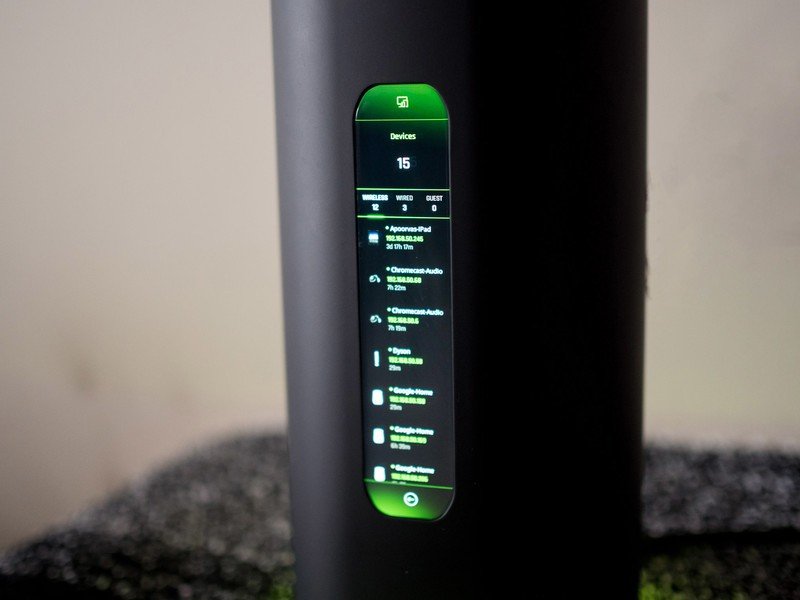
At the end of the day, the AmpliFi Alien is a great overall option if you're looking to switch to a Wi-Fi 6 router. With outstanding performance and reliable connectivity, the router will make an immediate difference to your home network.
The large screen comes in handy to get an overview of real-time traffic and the number of devices connected to your home network. The design is quite striking, and it is extremely easy to set up and manage. Unique features like Teleport give the Alien an edge, and all things considered, it is a remarkable Wi-Fi 6 router.
4 out of 5
Sure, there are a few drawbacks like the lack of a 160MHz channel and no wireless backhaul, but that doesn't make a huge difference in day-to-day use. For what you're paying here for the standalone model, you're getting a decent value.

Harish Jonnalagadda is Android Central's Senior Editor overseeing mobile coverage. In his current role, he leads the site's coverage of Chinese phone brands, networking products, and AV gear. He has been testing phones for over a decade, and has extensive experience in mobile hardware and the global semiconductor industry. Contact him on Twitter at @chunkynerd.
